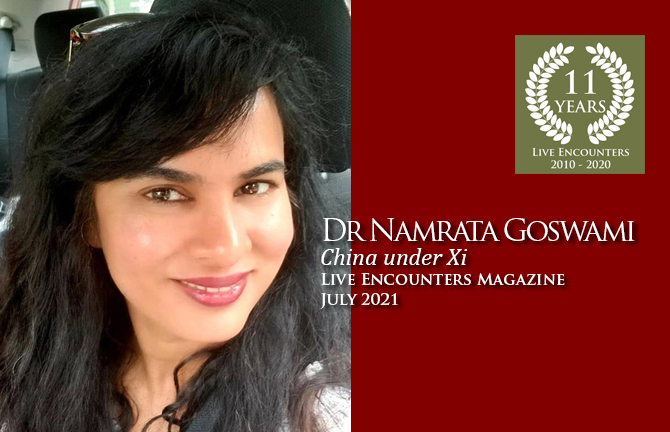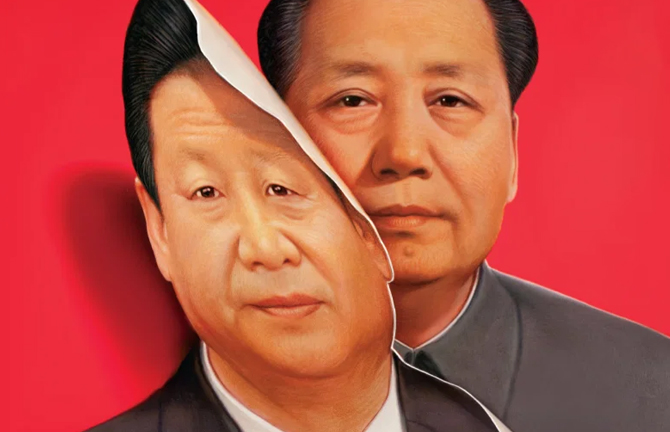
Live Encounters Magazine July 2021.
 Dr. Namrata Goswami is an independent scholar on space policy, great power politics, and ethnic conflicts. She was Research Fellow at the Institute for Defence Studies and Analyses, New Delhi, a visiting Fellow at Peace Research Institute, Oslo, Norway; La Trobe University, Melbourne, Australia; and University of Heidelberg, Germany. In 2012, she worked as Jennings-Randolph Senior Fellow at United States Institute of Peace, Washington D.C. and was awarded a Fulbright-Nehru Senior Fellowship that same year. In 2016-2017, she was awarded the MINERVA grant awarded by the Office of the U.S. Secretary of Defense to study great power competition in outer space. Her book on The Naga Ethnic Movement for a Separate Homeland Stories from the Field, was published by Oxford University Press in March 2020. Her co-authored book on Scramble for the Skies: The Great Power Competition to Control the Resources of Outer Space was published October 2020 by Lexington Press, an imprint of Rowman and Littlefield. She is currently working on an academic book project on China’s Grand Strategy and Notions of Territoriality. She has published widely to include in The Diplomat, the Economic Times, the Hindu, The Washington Post, Ad Astra, Asia Policy, Live Encounters Magazine, Cairo Review.
Dr. Namrata Goswami is an independent scholar on space policy, great power politics, and ethnic conflicts. She was Research Fellow at the Institute for Defence Studies and Analyses, New Delhi, a visiting Fellow at Peace Research Institute, Oslo, Norway; La Trobe University, Melbourne, Australia; and University of Heidelberg, Germany. In 2012, she worked as Jennings-Randolph Senior Fellow at United States Institute of Peace, Washington D.C. and was awarded a Fulbright-Nehru Senior Fellowship that same year. In 2016-2017, she was awarded the MINERVA grant awarded by the Office of the U.S. Secretary of Defense to study great power competition in outer space. Her book on The Naga Ethnic Movement for a Separate Homeland Stories from the Field, was published by Oxford University Press in March 2020. Her co-authored book on Scramble for the Skies: The Great Power Competition to Control the Resources of Outer Space was published October 2020 by Lexington Press, an imprint of Rowman and Littlefield. She is currently working on an academic book project on China’s Grand Strategy and Notions of Territoriality. She has published widely to include in The Diplomat, the Economic Times, the Hindu, The Washington Post, Ad Astra, Asia Policy, Live Encounters Magazine, Cairo Review.
Scramble for the Skies by Namrata Goswami and Peter A. Garrestson: https://rowman.com/

In April 2020, Baogang Guo highlighted the academic term, ‘partocracy’ with Chinese characteristics in his article, “A Partocracy with Chinese Characteristics: Governance System Reform under Xi Jinping.” [1] Guo specified that ‘partocracy’ captures China under President Xi Jinping’s leadership, and not western concepts like authoritarianism and totalitarianism. Under Xi, there has been a concerted effort to institutionalize the Communist Party of China (CPC) into every facet of Chinese governance. Xi asserts that his goal as Chinese President is to bring back the party and its legitimization process into every aspect of Chinese life, creating a central node of governance and guidance structure. Critically, Xi is undertaking an effort to ‘institutionalize, legalize, and rationalize’ the role of the CPC into what he calls a modern socialist state with Chinese characteristics.[2] The focus of these new terminologies is on regime resilience and creating a more effective, transparent rule by law, not rule of law, of Chinese life.[3] This, Xi, stresses, creates predictability, stability and fairness thereby ensuring that meritocracy is the key enabling factor and corrupt party officials will have little capability to engage in underhand dealings and bribes. This also means that the loyalty to the CPC has been again inscribed into the Chinese constitution, with Xi creating the impression of a modern, adaptable CPC of more than 90 million members.
What does this Mean for China?
Partocracy as an analytical tool implies that the CPC is fast emerging as the institutional governance mechanism of the Chinese party state, where stringent rules of admission into party membership, merit-based promotions and sessions of indoctrination for CPC members to Xi’s philosophy is becoming the norm.[4] This Chinese governance structure, based on the centrality of the CPC, is reflective of the CPC’s complete control of China’s state resources and the military. While connections to the revolutionary CPC leaders of the 1940s still has relevance to include President Xi, whose father Xi Zhongxun, was among the first generation of Chinese CPC leaders, the focus under Xi is on meritocracy and potential for hard work. Xi has also made fighting corrupt officials within the CPC as an important goal. Towards that effect, in 2018, China set up the National Supervisory Commission (NSC) that had the power to arrest anyone on suspicion of corruption, with no access to legal counsel upto six months.[5] The NSC was established by the National People’s Congress (NPC) regulated by the Supervision Law of the PRC.[6] The NSC is a powerful body with direct reporting to the NPC, making it equal to the State Council, the Supreme People’s Procuratorate and China’s judiciary. The NSC is now the supreme body for anti-corruption superseding all other state or provincial anti-corruption bodies and works in close collaboration with the Central Commission for Discipline and Inspection (CCDI) of the CPC.[7] Chinese citizens, accused of corruption, faces investigation by the NSC to include non-party members, public employees, those engaged in scientific research and education, managers of state-owned enterprises, and the health sector. The NSC reflects the dominant role played by the CPC in state wide governance mechanisms highlighting Xi’s ideology of party dominance in China’s political and social life. While the focus of the NSC is on prevention rather than punishment,[8] the concerns of overreach, illegal detention based on party loyalty issues, false corruption charges brought on dissidents, and the fact that legal counsel is denied for six months, creates a situation of fear, with the NSC’s insipient entry into law enforcement roles.[9] Politically, the CPC has access to the vast resources of the Chinese state without any change in regime, and Xi therefore stresses on regime resilience and legalization of the processes to create a future where the CPC becomes ubiquitous with the Chinese state.
Xi’s Philosophy
In order to understand the wide-ranging structural changes underway in China to include Chinese governance, the overarching role of the CPC, and its control over the military and state resources, we need to understand Xi’s philosophy for ruling China. Almost all Chinese Presidents had a governing philosophy to guide their stint at the highest level of decision making. Deng Xiaoping played a critical role in developing China into a modern force and help guide it out of the devastation of the Mao Zedong era to include the Great Leap Forward and the Cultural Revolution that left millions of people dead. Deng highlighted the critical importance of ‘socialism with Chinese characteristics” which meant ‘reform and opening up’ of China’s economy while maintaining the party state as espoused by Vladimir Lenin. Deng shifted the focus of the Chinese economy to manufacturing under strict economic guidance, but he was also amenable to CPC intraparty reform until the events of Tiananmen square of 1989 put an end to the party reform enterprise. Deng, however, did not offer the Chinese system of governance or saw China’s role in the world as shaping international politics at the systemic level. In 2000, Jiang Zemin offered his philosophy of The Three Represents. The CPC opened up its membership beyond just one class to those engaged in business and other productive activities, with Jiang stressing that “the Three Represents is imbued with the same spirit as Marxism-Leninism, Mao Zedong Thought and Deng Xiaoping Theory, and it reflects new demands on the work of the Party and the state arising from developments and changes presently occurring in China and the world over. The Three Represents is a powerful theoretical tool for strengthening and improving Party building and promoting the self-improvement and development of China’s socialist system…the whole Party must always maintain the spirit of advancing with the times and constantly extend Marxist theory into new realms; it must give top priority to development in governing and invigorating the country and constantly break new ground and open up a new prospect in the modernization drive; it must fully mobilize all positive factors and constantly generate new strength for the great rejuvenation of the Chinese nation; and it must improve its Party building in a spirit of reform and constantly inject new vitality into itself.” [10] Jiang Zemin was of the perspective that the CPC needs to be adaptive and represent overall Chinese aspirations and modernization, expanding its reach across the Chinese citizenry. President Hu Jintao stressed on harmonization, and scientific outlook on development, moving away from a deep focus on Marxist Leninist Mao Zedong thought, to a focus on building legitimacy of the CPC based on modernization, scientific temper and socialism with Chinese characteristics.[11]
Enter Xi. Unlike Deng, Xi stresses on the need to move the Chinese economy from manufacturing to technological innovation and services. He aspires to establish China as a lead actor in international politics, propelled by the guiding role of the CPC, who he views as synonymous to the role Chinese emperors played in the lives of ancient China, and to create an economy where Chinese domestic consumption helps propel it to becoming the lead economic actor by 2050. Xi underscores the importance of institutionalization of the CPC into every aspect of Chinese life unlike even how the Communist Party of the Soviet Union (CPSU) played a role in the life of erstwhile Soviet Union citizens. To this effect, he has offered ‘Xi Jinping Thought on Socialism with Chinese Characteristics for a New Era’. The ‘Xi thought’ is now inscribed into the Chinese Constitution and Xi has established himself President for life unlike his predecessors who gave up power after a decade long stint, except for Mao. Xi has also elevated himself to the stature of Mao. Xi’s thought highlights eight fundamental priority areas.
First, by 2035, China has to develop into a modern socialist country aimed at national rejuvenation, prosperous and scientifically advanced.
Second, tackle inequality in Chinese society by focusing on equitable growth under the watchful eye of the CPC, whose role for philosophical guidance is enshrined into the Chinese constitution under Xi.
Third, Xi makes it clear to the Chinese people that the only future path for development and prosperity is through the theory and system of Chinese socialism.
Fourth, Xi highlights the need for reform and modernizing the CPC for effective governance.
Fifth, the need for such governance must be propelled by rule by law, essentially a socialist rule by law with strict control laying with the CPC and the institutions that merge with it across all levels of Chinese society.
Sixth, to create a strong China, it is the CPC’s job to build a strong military, to include China’s space military capacities, “the Party’s goal of building a strong military in the new era is to build the people’s forces into world-class forces that obey the Party’s command, can fight and win, and maintain excellent conduct”.[12]
Seventh, to showcase China’s role in the world and as a leader in international politics, offering an alternate set of institutions like the Belt and Road Initiative (BRI) in direct challenge to American primacy. This is where Xi departs from earlier leaders like Deng and Hu, by asserting the growing global role that China is playing and will play in shaping the future of humanity.
Eight, “the CPC leadership is the defining feature of socialism with Chinese characteristics and the greatest strength of the system of socialism with Chinese characteristics; the Party is the highest force for political leadership. The thought sets forth the general requirements for Party building in the new era and underlines the importance of political work in Party building.”[13]
These eight blocks of Xi’s thought are supported by fourteen principles which includes envisioning a new rule by law-based governance, meritocracy, improve living standards, promote national reunification (read Taiwan), uphold the absolute rule by the CPC but also ensure a rigorous governance over CPC members.
Towards this end, Xi has, since 2013 when he assumed power, strengthened the role of an institutionalized CPC, with party representation in almost all institutions in China, and indoctrination into Xi thought as is revealed by CPC Central Committee’s Publicity Department and Organization Department issuing a circular in February 2021 for all CPC members to study 100 questions and answers on Xi’s thought.[14] Xi has also tightened his hold on China’s military and space program, as well as strengthened Artificial Intelligence enabled autonomous surveillance capacities of Chinese society. Very similar to Mao’s Little Red Book, Xi’s Thought is now published as a book and is mandatory for senior Chinese state officials, discussed in academic seminars, mandatory for student study as well as a resource for indoctrination of the Chinese military into his thought.
While developing China internally is one aspect of Xi’s thought, the most strategically consequential aspect of Xi’s thought is his focus on Chinese national revival and international leadership backed by military power. It indicates a China that is now assertive about its global role and assuming leadership across domains to include high technologies. For Xi, the China based on his thought is a China based on strict adherence to the leadership of the Communist Party grounded on the academic concept of partocracy, and adverse to western style democracy and rule of law based on transparency, free press, individual rights and liberties. For Xi, in matters of individual rights, the CPC takes precedence, and those who dissent are treated harshly within his conception of rule by law. This structural effort by Xi surpasses all our understanding of previous oligarchies, like the Soviet Union, where collapses at the highest political level led to disintegration due to the inability of the CPSU to institutionalize its role across the country based on effective governance and rule by law. This is where Xi’s CPC departs from its predecessor like CPSU with structural systems-based legalization, legitimization and rationalization.
The China under Xi significantly differs from the China under Deng or Ziang or Hu with Xi’s effort to institutionalize, legalize and rationalize the role of the CPC into China’s modern socialist governance structure with deep seated societal implications for the future. This is the China under Xi that we need to contend with, a CPC leader led country but with even greater impact on international politics and the rule of law as envisioned by liberal institutionalists and the western international legal regimes. Because for Xi and the China that is emergent, it is China led rule by law. not rule of law, that we will have to deal with as we move into the future.
[1] Baogang Guo, “A Partocracy with Chinese Characteristics: Governance System Reform under Xi Jinping,” Journal of Contemporary China, 29/126 (April 2020), pp. 809-823, https://www.tandfonline.com/doi/abs/10.1080/10670564.2020.1744374?journalCode=cjcc20; for more on the concept of partocracy, please see Suela Ibraimllari, “Partocracy or Democracy: A Popperian Perspective of Democracy in Albania,” European Journal of Multidisciplinary Studies, 2/2, Jan-April 2017, pp. 90-100, https://journals.euser.org/files/articles/ejms_jan_apr_17_nr_2/Suela.pdf
[2] Ibid.
[3] Ibid.
[4] Ibid.
[5] Tobias Smith, “Power Surge: China’s New National Supervisory Council”, The China Story, 2018, https://www.thechinastory.org/yearbooks/yearbook-2018-power/forum-absolute-power-corrupts-absolutely/power-surge-chinas-new-national-supervisory-commission/
[6] Supervision Law of the People’s Republic of China, March 20, 2018, https://www.legal-tools.org/doc/ef4c4d/pdf/
[7] Tobias Smith, “Power Surge: China’s New National Supervisory Council”.
[8] Li Li and Peng Wang, “From Institutional Interaction to Institutional Integration: The National Supervisory Commission and China’s New Anti-Corruption Model”, The China Quarterly, 240, December 2019, pp. 967-989, https://www.cambridge.org/core/journals/china-quarterly/article/abs/from-institutional-interaction-to-institutional-integration-the-national-supervisory-commission-and-chinas-new-anticorruption-model/154F3BFE419EEC69A2E453F7353E1A51
[9] Nectar Gan, “China’s National Supervisory Commission: Fresh, Bigger Fears Over Reach of New Anti-Corruption Super Agency”, South China Morning Post, July 19, 2018, https://www.scmp.com/news/china/policies-politics/article/2155888/fresh-bigger-fears-over-reach-chinas-new-anti-graft
[10] “Three Represents,” September 08, 2010, https://cpcchina.chinadaily.com.cn/2010-09/08/content_13918105.htm
[11] Guoxin Xing, “Hu Jintao’s Political Thinking and Legitimacy Building: A Post-Marxist Perspective”, Asian Affairs: An American Review, 36/4 (2009), pp. 213-226, https://www.tandfonline.com/doi/abs/10.1080/00927670903355196
[12] Xiang Bo, “NPC & CPPCC Annual Sessions 2018: Backgrounder: Xi Jinping Thought on Socialism with Chinese Characteristics for a New Era”, Xinhua, March 17, 2018, http://www.xinhuanet.com/english/2018-03/17/c_137046261.htm
[13] Ibid.
[14] “CPC Launches Campaign to Study Xi Jinping Thought”, Xinhua, February 26, 2021, http://www.xinhuanet.com/english/2021-02/26/c_139769319.htm
© Dr Namrata Goswami

